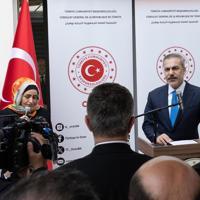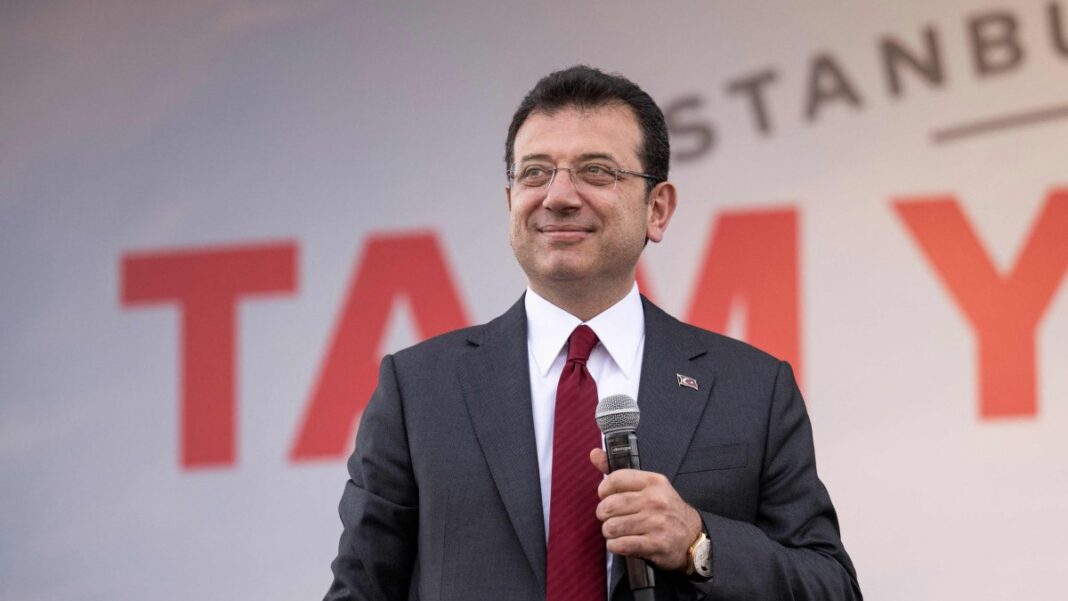Türkiye plans to pursue a dynamic approach in economic management rather than use “autopilot” policies in this period of trade wars and increasing global uncertainty, Vice President Cevdet Yılmaz said.
The biggest risk factor for Türkiye due to trade wars is “the more aggressive actions of countries that are at risk of losing the American market, especially China, in other markets,” he said.
“We can’t manage such periods by going on autopilot,” Yılmaz told reporters during a recent visit to the Black Sea province of Giresun.
“We are following these issues closely, and we will continue to follow closely, not only our own market but also the developments and decisions in the countries that are our export markets. As I said, I can say that we will exhibit dynamic management here,” the vice president was quoted as saying by Anadolu Agency (AA) in remarks published on Monday.
Top economy officials, including Yılmaz, Trade Minister Ömer Bolat, and Treasury and Finance Minister Mehmet Şimşek, along with industry, energy and agriculture ministers, were in Giresun on Friday to share details of the Eastern Black Sea Project (DOKAP) Action Plan.
Yılmaz, in his remarks, recalled that the U.S. has introduced some tariffs but is also open to negotiations and has initiated a process in this direction with many countries, and noted that Türkiye will continue these negotiations through the Trade Ministry, but suggesting that the outcome of the negotiations cannot be predicted at this stage.
Türkiye, which has quite a balanced trade exchange with the U.S., has been targeted with 10% baseline duties, which Turkish officials had earlier described as “best of worst” tariffs. They had also highlighted certain advantages in this regard, particularly the lower oil prices, which, if maintained, directly translate to potentially lower trade deficits.
This view was repeated by Yılmaz, who also said: “But here again, our positive side is that our domestic market is large, that is, we can say that we have a structure that is relatively domestically focused, and this constitutes a structure that limits the incoming effects. Under these conditions, we observe the decline in oil and other commodity prices. Since we are an importing country in these matters, we can say that the decline in prices in these areas is in our favor.”
Tariff negotiations
Bolat, related to tariff negotiations with Washington, meanwhile, said that his country would carry out the process in a constructive manner with mutual understanding.
“The first contacts on this issue have already been made, and will be held at the ministerial level in the coming days,” Bolat said.
He attended economic meetings along with other Turkish officials in Giresun and spoke to reporters on Friday.
Bolat said that U.S. President Donald Trump’s tariff decisions and retaliatory measures by other countries have created a huge “dust cloud” in the global economy.
“We think that we both do not deserve and do not expect a 10% tariff. But at this point, we will conduct our negotiations with the U.S. with a mutual understanding, in a positive environment, in a constructive way,” he said.
Bolat pointed out that the issues of how other countries will be affected by the developments in global trade and how this situation will affect Türkiye’s trade with these countries are important.
“This section is at least as important as Türkiye-U.S. trade relations, and we are making preparations at this point. In this sense, we will not allow Türkiye to become a warehouse where goods will be unloaded, especially by rival countries; we are determined in this regard.
“We will use all the powers given to us by world trade rules. In fact, it is a very difficult time for the World Trade Organization (WTO) because unilateral decisions have caused serious damage to the multilateral rule-based system in the world. We hope that in terms of global growth and global trade, a compromise will be reached between countries without the cost of this uncertainty being too high, and that trade will continue to be the engine of world growth,” Bolat added.
Economic program, inflation
The vice president, at the same time, reiterated that the general framework of the economic program the government has been implementing since mid-2023 will still be preserved.
“The basic framework of our program will still be preserved. What is this basic framework? Our basic priority is to reduce inflation, maintain our employment, production, and exports in a balanced growth, heal the wounds of the earthquake, and, on the other hand, produce permanent social welfare for our society. This main framework will continue,” said Yılmaz.
Turkish annual consumer price inflation slowed to 38.1% in March, extending its fall from a peak of around 75% last May.
Şimşek, who also evaluated developments, said he does not foresee Türkiye changing its economic course following recent market and trade developments, and inflation would very likely hit the central bank’s forecast range by year-end.
The central bank’s year-end inflation midpoint estimate currently stands at 24%, in a forecast range of 19% to 29%.
“It is too early to analyse the permanent effects of recent developments in domestic financial markets and the global economy on our program targets,” Şimşek told reporters in Giresun.
“What is essential is the determined implementation of our program. Our biggest priority is price stability, that is, a permanent decrease in inflation. We do not see any significant risk in this regard. In this context, we do not foresee any significant deviations in the program at this stage,” he said.
“There is limited depreciation in the lira, we expect the exchange rate pass-through to be weak since demand conditions are not very strong. When we evaluate all these effects, the probability of inflation occurring within the central bank’s forecast range is extremely high.”
He said the net effect in terms of the current account balance may be positive. While there is a risk that protectionism in the form of trade wars may negatively affect global growth, the tightening of domestic financial conditions would limit imports.
“Therefore, we see a high probability of a current account deficit well below what we foresaw (2% of GDP) in the medium-term program,” the minister explained.
Şimşek also said the clear message on the budget is that spending discipline will continue.
“Our aim with budget discipline is to support the disinflation process through a negative fiscal effect. Since tight financial conditions may have a limited negative effect on the budget, not from expenditure but from revenue, they will not be a significant concern for the program.”
Şimsek also informed that he will meet with rating agencies, investors and companies planning to shift supply to Türkiye during a visit to the U.S. this week.
“I will be in America this week for the IMF, World Bank and G-20 meetings. We will meet with rating agencies in New York at the beginning of the week and then with direct investors based in America,” he noted.
“We will meet with real sector representatives, especially U.S. companies that plan to shift their supply to Türkiye, especially following recent developments,” he said, referring to the tariffs imposed by Trump.
Şimşek said he would attend around 15 bilateral meetings or meetings organized by investment banks each day in the United States, and would convey the message that Ankara’s economic program will not change.
“In all these meetings, we will say that there is no change in the program, that there is a very strong political will behind the program,” Şimşek said.





